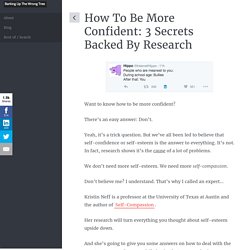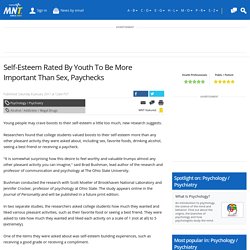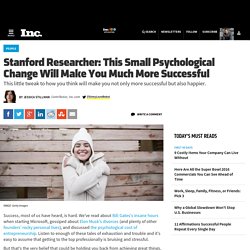

How to Grow from Your Regrets. Sometimes, regret is a deadweight that we carry through life, slowing us down and making our shoulders ache.

But other times, it turns into a kind of fuel; it propels rather than hinders, motivates rather than distracts. What’s the difference between these two outcomes? A new paper by researchers at UC Berkeley suggests that it might be self-compassion. The researchers recruited 400 adults and invited a group of them to identify their biggest regret, then write about it with self-compassion and understanding. Some wrote about cheating on their partner; others wrote about becoming estranged from their parents. In questionnaires administered afterward, participants who had taken a self-compassionate perspective toward their regrets reported more motivation for self-improvement compared to participants in the self-esteem and control groups. But why? If you’re carrying a burdensome regret, cultivating self-compassion may be easier than you think. How To Be More Confident: 3 Secrets Backed By Research.
Want to know how to be more confident?

There’s an easy answer: Don’t. Yeah, it’s a trick question. Self-Esteem Rated By Youth To Be More Important Than Sex, Paychecks. Young people may crave boosts to their self-esteem a little too much, new research suggests.

Researchers found that college students valued boosts to their self-esteem more than any other pleasant activity they were asked about, including sex, favorite foods, drinking alcohol, seeing a best friend or receiving a paycheck. "It is somewhat surprising how this desire to feel worthy and valuable trumps almost any other pleasant activity you can imagine," said Brad Bushman, lead author of the research and professor of communication and psychology at The Ohio State University. Bushman conducted the research with Scott Moeller of Brookhaven National Laboratory and Jennifer Crocker, professor of psychology at Ohio State. The study appears online in the Journal of Personality and will be published in a future print edition. Stanford Researcher: This Small Psychological Change Will Make You Much More Successful. Success, most of us have heard, is hard.

We've read about Bill Gates's insane hours when starting Microsoft, gossiped about Elon Musk's divorces (and plenty of other founders' rocky personal lives), and discussed the psychological cost of entrepreneurship. Listen to enough of these tales of exhaustion and trouble and it's easy to assume that getting to the top professionally is bruising and stressful. But that's the very belief that could be holding you back from achieving great things, according to Stanford researcher Emma Sepala, a Stanford researcher and author of the new book The Happiness Track "After working in many high-achieving environments ...
I noticed too many people pursuing 'success' at a cost to themselves," Sepala has written. The trouble is that science shows this exactly the wrong way to approach success. Be nice ... to yourself Which is fascinating, but also a bit general. Test how self-compassionate you are. Why Self-Compassion Trumps Self-Esteem. In this incredibly competitive society of ours, how many of us truly feel good about ourselves?

I remember once, as a freshman in college, after spending hours getting ready for a big party, I complained to my boyfriend that my hair, makeup, and outfit were woefully inadequate. He tried to reassure me by saying, “Don’t worry, you look fine.” Juan Estey “Fine? Oh great, I always wanted to look fine . . .” The desire to feel special is understandable. Not very well. How can we grow if we can’t acknowledge our own weaknesses? Continually feeding our need for positive self-evaluation is a bit like stuffing ourselves with candy.
The result is often devastating. And of course, the goalposts for what counts as “good enough” seem always to remain out of reach. Another way So what’s the answer? When I first came across the idea of “self-compassion,” it changed my life almost immediately. After getting my Ph.D., I did two years of postdoctoral training with a leading self-esteem researcher.